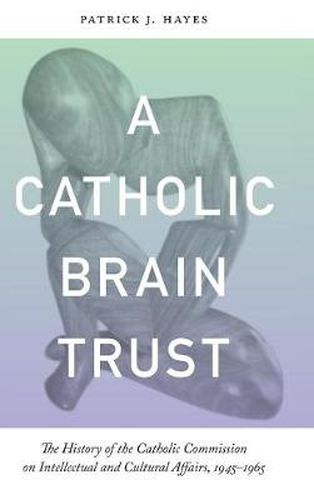Readings Newsletter
Become a Readings Member to make your shopping experience even easier.
Sign in or sign up for free!
You’re not far away from qualifying for FREE standard shipping within Australia
You’ve qualified for FREE standard shipping within Australia
The cart is loading…






This title is printed to order. This book may have been self-published. If so, we cannot guarantee the quality of the content. In the main most books will have gone through the editing process however some may not. We therefore suggest that you be aware of this before ordering this book. If in doubt check either the author or publisher’s details as we are unable to accept any returns unless they are faulty. Please contact us if you have any questions.
In A Catholic Brain Trust: The History of the Catholic Commission on Intellectual and Cultural Affairs, 1945-1965, Patrick J. Hayes chronicles the founding, development, and accomplishments of the CCICA from its beginnings immediately following the Second World War to 1965. This extensively documented study contributes to the history of American Catholicism by investigating a little-known effort on the part of Catholic intellectuals in the postwar period to shape Catholic identity in the United States, by bringing their individual and collective resources to bear on contemporary society and culture. Hayes demonstrates how a group of leading Catholic professors, college presidents, writers, government officials, scientists, and artists influenced Catholic culture through various media, through educational institutions, and through their participation in ecclesial- or government-sanctioned activities.
After outlining the preliminary background of the CCICA’s founding in 1946, Hayes examines its impact through two of its early projects: war relief for displaced scholars and participation in United Nations affairs. From 1948 to 1959, questions of the relationship between church and state especially occupied the Commission. Hayes looks at the impact of the famous lecture in 1955 by Monsignor John Tracy Ellis, American Catholics and the Intellectual Life, which, more than any single event, served to rally CCICA members, as well as the larger academic community and the American Catholic Church as a whole, around the question of Catholic intellectual identity. Hayes analyzes the CCICA’s influence on campus culture in the United States, touching on topics such as academic freedom and projects such as the Kirby seminars for younger scholars, a Catholic registry of academics working in the United States, and the New Catholic Encyclopedia. An epilogue treats the Commission’s last years of operation.
$9.00 standard shipping within Australia
FREE standard shipping within Australia for orders over $100.00
Express & International shipping calculated at checkout
This title is printed to order. This book may have been self-published. If so, we cannot guarantee the quality of the content. In the main most books will have gone through the editing process however some may not. We therefore suggest that you be aware of this before ordering this book. If in doubt check either the author or publisher’s details as we are unable to accept any returns unless they are faulty. Please contact us if you have any questions.
In A Catholic Brain Trust: The History of the Catholic Commission on Intellectual and Cultural Affairs, 1945-1965, Patrick J. Hayes chronicles the founding, development, and accomplishments of the CCICA from its beginnings immediately following the Second World War to 1965. This extensively documented study contributes to the history of American Catholicism by investigating a little-known effort on the part of Catholic intellectuals in the postwar period to shape Catholic identity in the United States, by bringing their individual and collective resources to bear on contemporary society and culture. Hayes demonstrates how a group of leading Catholic professors, college presidents, writers, government officials, scientists, and artists influenced Catholic culture through various media, through educational institutions, and through their participation in ecclesial- or government-sanctioned activities.
After outlining the preliminary background of the CCICA’s founding in 1946, Hayes examines its impact through two of its early projects: war relief for displaced scholars and participation in United Nations affairs. From 1948 to 1959, questions of the relationship between church and state especially occupied the Commission. Hayes looks at the impact of the famous lecture in 1955 by Monsignor John Tracy Ellis, American Catholics and the Intellectual Life, which, more than any single event, served to rally CCICA members, as well as the larger academic community and the American Catholic Church as a whole, around the question of Catholic intellectual identity. Hayes analyzes the CCICA’s influence on campus culture in the United States, touching on topics such as academic freedom and projects such as the Kirby seminars for younger scholars, a Catholic registry of academics working in the United States, and the New Catholic Encyclopedia. An epilogue treats the Commission’s last years of operation.